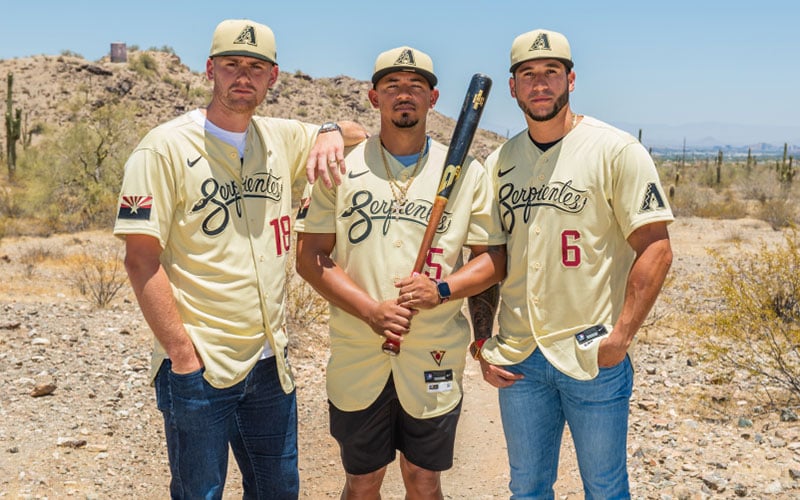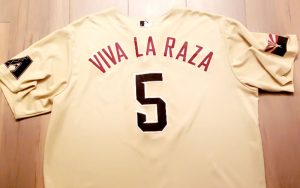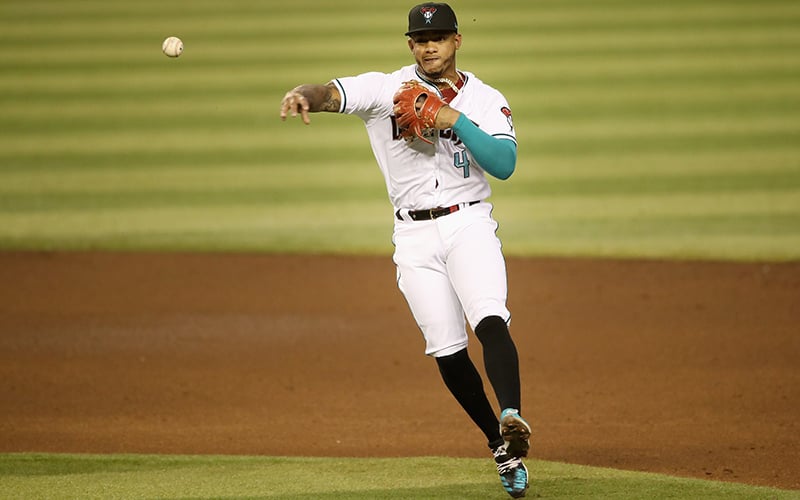
The Diamondbacks’ City Connect jerseys showcase the colors of the desert and feature the word “Serpientes” – a Spanish translation for “snakes” – across the chest. (Photo courtesy of Arizona Diamondbacks)
PHOENIX – “Nuestra ciudad. Nuestro estado. Nuestro equipo. Our city. Our state. Our team.”
Felipe Garcia’s voice rings strong, announcing the new Diamondbacks Nike City Connect jerseys. Featuring “Serpientes” across the chest, a snake curled around a red sun and the Arizona flag, the Sonoran-sand-colored jerseys pay homage to the Hispanic community in Arizona.
To loyal fans like Brenden Cabral, who scored one of the City Connect jerseys before the initial stock sold out, the Diamondbacks celebrating their Hispanic fans through the new jerseys is one half of an important symbiotic relationship: The Hispanic community features some of the most avid Diamondbacks fans, and the Diamondbacks purposefully include them in promotions and other activities.
“It means a lot because when you look around you can just notice most of the fans that go to the game all the time are the Hispanic fans,” Cabral said. “It’s been like that for a long time and it’s just nice to pay tribute.”
Garcia, the executive vice president for Visit Tucson, is a member of the Los D-backs Ambassadors Council. He emphasized that these jerseys aren’t a one-off “check mark” the Diamondbacks made to the Hispanic community. They’re part of a commitment that spans years.
“It’s really true and honest to that vision about diversity inclusion, it’s not a poster child,” Garcia said. “There’s very few organizations that I’ve seen around anywhere in the U.S. that have that real commitment to the Hispanic community as the Diamondbacks.”
Jerry Romo spearheaded the Diamondbacks’ efforts to connect with the Hispanic community for five years as the Senior Manager of the Diamondbacks’ Hispanic Marketing team until he left to form his own company, Escala Media, in 2020.
During Romo’s tenure, the Diamondbacks stepped up their efforts to reach out to the Hispanic community, debuting La Terraza, a Latino-themed area in Chase Field in 2016 and adding accent marks to their jerseys in 2015, a year before MLB’s Ponle Acento initiative took off.
Romo also oversaw a partnership with the Mexican Pacific League, inviting each team to send representatives to a Diamondbacks game on August 31, 2019, and adding a live band in the stands, playing off the Mexican tradition of, in Romo’s words, making every game, “a big Fiesta.”
The event was successful enough to break the Chase Field all-time attendance record, showing the strong support the Diamondbacks have within the Hispanic community.
Romo said the Los D-backs Ambassadors Council helps make sure events and promotions are authentic. Though he left the organization, he’s proud of what he did and glad the committee still exists because he doesn’t want the Diamondbacks to exclude such a large group of fans.
“You would put yourself at a huge disadvantage if you weren’t looking that way,” Romo said. “If you’re going to do something you have to have the right people in place to make sure that you’re doing it right. We weren’t going to do something just for Hispanic heritage day to say, ‘OK, we celebrated the day, check mark, turn the page.’ No, this is a year round thing.”
The jersey could have economic significance as well. Latino buying power is projected to reach $57.2 billion in Arizona by 2022, according to the 24th annual DATOS report, “The State of Arizona’s Hispanic Market,” released in October by the Arizona Hispanic Chamber of Commerce.
Arizona is 31.7% Hispanic, according to the U.S. Census Bureau. That’s almost twice the national percentage of Hispanic people, which is 18.5%. Emilio Gaynor, the chair of the Los D-backs Ambassadors Council, said the Diamondbacks have a responsibility to serve that community through gestures like donations to nonprofits that cater to Hispanic people in Arizona and providing tickets to Hispanic youth who may not get to see a game otherwise.
He hopes the City Connect jerseys will draw attention to those efforts, which he said have no comparison to other sports franchises.
“Sometimes in serving the community continuously and constantly, you don’t get the recognition that you deserve,” Gaynor said. “What these jerseys have done is just open the eyes of people that maybe hadn’t seen that before.”
The Diamondbacks are on pace for 46 wins this season, five less than their current worst record over a full season: 51 wins in 2004. Gaynor said the City Connect jerseys give fans a reason to celebrate the Diamondbacks despite their lack of success on the field.
Cabral agreed.
“It’s really refreshing, even through the bad times, to have something that resonates with the fans because the fans are the people who are most important right now during the bad times,” he said.
Cabral, who is also a lifelong Suns fan, said the Suns’ postseason run gives him hope that the Diamondbacks can turn things around, too.
“The Suns went from the worst team in the NBA to the finals within two years so why can’t the D-backs do that,” he said.

Brenden Cabral, a longtime Diamondbacks fan, had his jersey customized to say “Viva la Raza” because he wanted to represent his Hispanic heritage. (Photo courtesy of Brenden Cabral)
The details on the jersey, including the Valley of the Sun logo and the old school snakehead, make the jerseys “clean,” Cabral said.
The Diamondbacks debuted the jerseys as one of the first six teams to have a Nike City Connect jersey. They plan to wear them a few other times throughout the season including Hispanic Heritage Weekend which is Sept. 24 to 26.
Graham Rossini, senior associate athletic director at Arizona State, who was Vice President of Special Projects and Fan Experience for the Diamondbacks until March, said Major League Baseball and Nike approached the Diamondbacks to be one of those flagship six teams in Fall 2019.
The team immediately said yes.
From there, the Diamondbacks team started brainstorming. Rossini said they briefly considered The Valley branding, but when they heard the Suns Nike City Connect jerseys would be Valley themed, they wanted something fresh.
The idea for Las Serpientes emerged while Rossini, former Diamondbacks star Luis Gonzalez, Diamondbacks President & CEO Derrick Hall and Josh Rawitch, the former senior vice president of content and communications for the team, were flying to Mexico City, where the club was supposed to play before the COVID-19 pandemic shortened the 2020 MLB season. Hall and Gonzalez texted Rossini and Rawitch the idea for Las Serpientes and the foursome ran with the idea.
“We really wanted something that would resonate and get the Hispanic community excited,” Rossini said. “They’ve really poured into the organization and been supportive.”
The team made sure to include all the Hispanic and Latino players on their roster at the time in the decision-making process. Rossini emphasized that the team didn’t want the players wearing a uniform they didn’t believe in, especially when it came to the purpose of connecting with the Hispanic community.
The Diamondbacks weren’t aware of what the other five initial teams were planning but Rossini said Nike told them they were onto something great, giving the Diamondbacks reassurance that they would stand out among the other City Connect jerseys.
From Cabral’s perspective, they succeeded.
“I really like that ours is kind of more personal and it’s not just looking like it was made in some video game or something like that,” he said.
Rossini was thrilled the launch went well because it’s rare to have such overwhelmingly positive feedback, especially on social media.
“I’m very proud of it,” Rossini said. “It was a labor of love.”
The benefit of the jersey could be far-reaching, Hall said in a statement.
“This concept is about bringing our community together, with respect for the past and an eye toward the future.”

